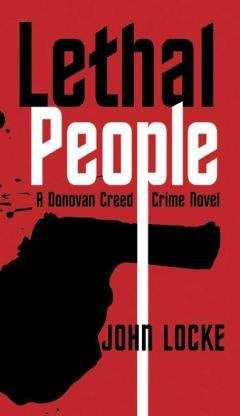John Locke - Wish List
“You a surgeon?”
“No.”
“Faith healer?”
“No.”
“Not much you can do then.”
“But she’s dying!”
“Then let’s remember her as she was, before the bad times. Wait a minute. Did she ever bake cookies for you?”
I nodded.
“Goody. Cling to that happy thought till closing time. But don’t let it interfere with your work.”
I know you think Hilda can’t be this bad.
You’re right.
She’s worse.
Chapter 6
Lunch. Second best part of the day, next to closing time.
Unless I’m entertaining a client, I only get forty-five minutes, so I have to make it count. I rush out the door, jump in my eight-year-old Taurus, and head for Tokyo Blue, where every Monday they offer a discount for those who sit at the sushi bar and order off a special menu. If I can get a seat at the bar, I’ll have time to make lunch happen. If not, it’s burger and fries, back at my desk.
The drive is four blocks to Broadway, two to Eighth, where a nearby parking lot provides easy access to the restaurant. Naturally, the lights are timed to make me stop at every intersection, which gives me plenty of time to think about the shameful way I’d spent the morning. I’d been forced by desperation to turn to the one thing I swore I’d never do: write letters to total strangers, invoking their children’s affiliation with my niece, who attends Bluegrass Academy, the city’s most prestigious private school.
I have two hours to change my mind, but the letters are already in the mail bag for the two o’clock run. I felt dirty signing my name to the sixteen dreadful letters, all of which had been personalized with information I extracted from my poor niece, Reece.
I wince thinking about the expression I’ll see on Lissie’s face tomorrow when her sister calls to tell her the disgusting way I’m pimping loans. Would she read one of the letters aloud to my wife? Of course she will:
Hi John and Beth,
My niece, Reece, told her Aunt Lissie and me how “awesome” your daughter, Meagan is. Apparently, our girls are quite the pair! Reece isn’t ours, of course, but we get her on “loan” regularly. And that thought made me wonder if Meagan’s parents are getting the best possible terms on their “loans.”
On the chance you might benefit from the best loan rates in town, I’d like to call you Wednesday to see if we can meet on Thursday, so I can offer you a complimentary portfolio review.
Sincerely,Charles ‘Buddy’ Pancake.
I know what you’re thinking: could I possibly sink any lower? Stick around. You have no idea.
So sure, I hate myself. How could I not? But I loathe my job and my bosses even more.
How bad is my job? When I think about today’s lone bright spot, this is what I come up with: I only have to hear “Tie a Yellow Ribbon” and “Please Release Me” two more times today.
Unless Hilda makes me stay till six-thirty.
In which case I’ll kill myself.
Chapter 7
Tokyo Blue is filling up fast, but I spot three empty seats at the sushi bar. I claim the middle one, and within seconds a long-haired kid in a corduroy jacket and designer jeans grabs the one to my left. I can’t help but notice the kid’s Prada loafers and wonder how he managed to find employment that allows him to dress like this, and pays him well enough to afford it. I’m about to ask what he does for a living when I hear a voice to my right say, “What’s good here?”
I turn my head to find the seat on my right occupied by an elderly lady wearing a hat that looks so ridiculous, people behind her are pointing and laughing. It’s enormous, and beige, with a dozen huge, mud-brown feathers protruding a foot out the top, arranged in a circle, like some sort of aviary Stonehenge. I can’t tear my eyes away from it, and wonder if maybe someone is filming the customers’ uproarious reactions for a hidden camera TV show.
“What’s good here?” she repeats.
“I’m sure it’s all good,” I say, slightly annoyed. I’m thinking about the whiz kid on my left, wondering if he’s self-employed. Maybe he could use a line of credit to expand his business.
The elderly lady says, “What do you order?”
I frown. I’d hoped to have a quiet lunch, maybe fortify myself with a glass of sake to keep me from going back to work and cutting Hilda’s head off. For a moment I think about stuffing her bloody, severed head in her panty hose like so much sausage, and smuggling it out of the bank. I picture her fat head bobbing up and down in the Ohio River current like a volleyball.
“I usually get the Derby Roll,” I say. “It’s got tempura shrimp in it. I don’t usually go for the raw stuff.”
She’s watching the sushi chef pack a roll.
“Does he touch everyone’s food with his hands like that?” she says, her voice much louder than necessary.
The sushi chef glares at her across the top of the glass bar, and I can only hope he doesn’t think we’re together. I look at his face and feel like hiding under my chair. She can’t possibly comprehend the magnitude of the insult she’s given him—suggesting he’s unclean. I try to diffuse the tension before the old bat insults him again.
“What type of sushi do you normally like?” I ask.
“Never tried it. Nor will I, after watching Tokyo Joe put his hands all over the food like he’s searching for a tumor.”
“For the love of God!” says a young lady on the far side of the bar. She gives her ahi tuna a look of horror and lets it fall to her plate.
“Well, if you don’t eat sushi…” I say to the old bat.
“I’m here for my granddaughter.”
I don’t understand. If she’s here for her granddaughter, why is she sitting at the raw bar with me?
“Did she stand you up?”
Her face registers surprise. “Of course not! She’s running late.”
I nod. My interest lies only in the kid on my left, and who, if anyone, is handling his finances. But I can’t seem to shut the lady up. I’ve become a conversation hostage.
“That’s what they say nowadays,” she says. “’Running late.’” She picks up a plastic menu in her gloved hands and frowns. “What does ‘running late’ even mean? She’s not running, she’s just late.”
The young man on my left finally looks up. A wave of recognition passes over his face.
“Mrs. Blankenship?”
She tilts her head up so she can peer at him through her bifocals.
“Do I know you, young man?”
He stands.
“Not personally, ma’am, but I help manage your AMCT.”
“My what?”
“Ali Maddox Charitable Trust.”
“That’s Allison,” she says, emphatically. “Not Ali.”
“Yes, of course. I’m sorry. We often abbreviate, and shouldn’t. My mistake.”
Extending his hand to her he says, “I’m Rob Ketchel.”
She nods. “I don’t shake hands. Nothing personal, but you look like a scruffy vagabond to me. I suppose it’s the style nowadays.” To me she says, “I like the cut of your jib, though.”
She turns her attention back to the menu.
Rob is uncomfortable standing there with his hand outstretched. He holds the pose a moment, then reclaims his seat.
“My granddaughter intends to hit me up for a loan,” Mrs. Blankenship says. “You’d think she’d have the courtesy of meeting me at a decent restaurant and showing up on time.”
My outlook brightens. “A loan, you say?”
Chapter 8
Even without the hat, Mrs. Blankenship is overdressed for Tokyo Blue. She’s wearing a tan linen skirt, white silk blouse, and a linen jacket that’s too young and hip for her. The jewelry adorning her hands and wrists is the old fashioned, inherited kind.
It’s finally coming together for me: Mrs. Blankenship. The Allison Maddox Charitable Trust. Sitting next to me, liking the cut of my jib, is none other than Whitney Blankenship, one of the wealthiest women in America.
I signal the waitress and clear my throat.
“I’ll have a Derby Roll, and my lady friend will have a miso soup and salad.”
Before Mrs. Blankenship can protest, I say, “My treat.” Then I whisper, “They don’t touch the soup or salad with their fingers.”
She assesses me a moment, and says, “Well, why not? Serves my granddaughter right. I’ll just start eating without her.”
“An excellent lesson in punctuality,” I say. Then add, “What type of loan is your granddaughter seeking?”
Mrs. Blankenship raises her eyebrows at my impudence.
“I’m only asking because I might be able to help. I’m a loan officer.”
“For whom?”
“Midwest Commercial.”
“Truly?”
“Would I lie to you?”
“I wouldn’t know. You might.”
“True. But why would I?”
She ponders this a moment, then says, “How’s Jake?”
She’s referring to Jackson “Jake” Robards, our President and CEO. Whitney Blankenship’s eyes are dancing with humor. She’s toying with me. Before I can respond she says, “When I wish to secure a loan from your bank I call Jake personally. Why on earth would I waste my time dealing with you?”
I hear Rob Ketchel’s soft chuckle to my left. He’s enjoying what he assumes will be the evisceration of my ego. But I’ve got an idea, an argument so brilliant and powerful, it seems divinely inspired.
“Mrs. Blankenship,” I say. “Have you loaned money to your granddaughter in the past?”
“I don’t see what business that is of yours.”
“Bear with me, please. I’m trying to help. What’s your granddaughter’s name?”
“Chelsea.”
“I’m going to assume that Chelsea is like a lot of grandchildren I’ve worked with, and if so, she’s probably had a number of business ideas that haven’t always been sound. I’m also going to assume that you’re a loving grandparent who has loaned her money despite that fact. Or, at the very least, you co-signed her notes.”
“Well of course I have. I love my granddaughter.”
“But when we lend money for poor decisions, we’re not teaching our youngsters sound financial practices, are we?”
“Are you suggesting I refuse to lend her the money?”
“Yes.”
“Excuse me?”
“In a way.”
She fixes a haughty gaze on me. “What’s your intention here?”
“To protect your money, and help your granddaughter, Chelsea, become financially responsible.”
“And?”
“And to convince you I’m the perfect person for this situation.”
“You, and not Jake Robards.”
“That’s correct.”
“And why is that?”
I smile. For once in my life I’m about to turn my biggest weakness as a loan officer into my biggest strength.
“My loans are required to go through committee for approval.”
“Well, I don’t see how that helps.”
“If you send Chelsea to me, I can help her formulate a business plan that will have to be approved by our loan committee. If they don’t like her idea, you’ll have the perfect excuse to keep her out of your pocketbook.”
She nods her head slowly. “And if they approve the loan?”
“They might lend Chelsea the money directly, and keep you out of it completely. Worst case scenario, you might have to guarantee the loan. But if they approve her loan, it’s almost certain to be a good risk.”
She thinks about it a moment, then smiles.
“What’s your name, young man?”
“Buddy Pancake,” I say, smiling broadly.
“You’re joking,” she says.
“Not in the slightest.”
She laughs heartily. Then says, “How much is Mrs. Butterworth?”
I laugh lustily, as though I’d never heard such a witty remark in all my life. “What,” I say, “maybe five dollars?”
She howls with laughter.
Chapter 9
I march into the office like a bullfighter with mustard on his sword.
“Howdy, Gus!” I holler.
I’ve startled him awake. He jerks to attention, grabs the butt of his gun before realizing I’m an employee on my way back from lunch.
I smile at the tellers. “Good afternoon, ladies!”
I walk over to the mailbag, turn it upside down on the mail desk and remove my sixteen shameful letters from the pile. Then I put the remaining letters back in the mail bag and look around the room. All eyes are studying me, just as they were on Friday when Oglethorpe threatened to can me. Only this time there’s a nebbish curiosity in the air. I see Hilda pointing at her wrist watch, and I break into a loud song, effectively drowning out the Muzak. I’m performing both parts of Richard Wagner’s Tannhauser, the Bugs Bunny and Elmer Fudd version:
“Oh, Bwoonhiwda you’re so wuuuvwy!”
“Yes I know it, I can’t heeelllp it!”
“Oh, Bwoonhiwda be my wuv!”
“For I wuuuuvvvvv youuuuuuu!”
I bow and hold my hands high in the air, expecting great applause.
The silence is deafening.
All faces turn to Hilda, whose mouth is hanging open like the door of a cargo plane. Suddenly she spins around, grabs her pen, and begins writing furiously in her notebook.
“Write all you want, you dreary shrew,” I say, aware there are no customers on the floor. “But when you’ve completed your thought, write this down in your stupid journal and shove it up your big fat ass: I just landed the biggest account this bank has ever had!”
All afternoon I refuse to answer questions, saying only, “At nine o’clock tomorrow morning, you’ll see. I’m going to own this bank!”
That evening, as I pull into my driveway, I see Lissie standing outside the front door holding an envelope in her hand. I stop and get out, wondering if it’s a late payment notice. She runs to me and throws her arms around my neck.
“Lissie, what on earth?”
“I can’t believe you did this for me!” she says.
“What?”
“Nothing says apology like front row seats to the Springsteen concert! How in the world did you manage this?”
My mind is going a hundred miles an hour. “Where did you get those?”
“The same way you sent them, my darling. Zip express! God, I could just eat you up!”
And a few minutes later, she did.
Chapter 10
“You’d better get going, rock star,” Lissie says. “You’re going to be late.”
“No worries. I’m bulletproof.”
It’s Tuesday morning and I can’t believe how fast my luck has changed. In an hour I’ll be sitting with Chelsea Blankenship and her business associate, Emma Glendenning, who are applying for a million dollar line of credit for their new business. I don’t know any of the details yet, but by the time I complete the loan app it will be a sure thing. Although Oglethorpe is demanding three million in new loans, Whitney Blankenship has promised to run all future Chelsea loans through me, which means my position at Midwest Meadow Muffin is cemented.




